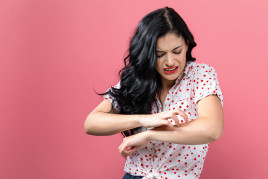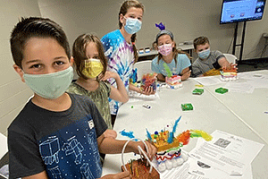No health insurance? How to follow-up after a skin cancer screening
Have you just had a free skin cancer screening and been told that you have a spot on your skin that could be skin cancer?
If you do NOT have health insurance, you can still get medical care. In fact, getting medical care is important because:
All — or part of the spot — must be removed to find out if you have skin cancer. If something looks like skin cancer, the only way to know if it is skin cancer is to look at it under a microscope.
If you don’t have skin cancer, you’ll know you’re okay.
If you have skin cancer, you can get treatment.
Skin cancer screening
People of all colors get skin cancer, so it’s important to get screened.

2 ways to get medical care without health insurance
Go to a low-cost or free clinic: You can find these clinics throughout the United States. The following websites can help you find a clinic:
Call a dermatologist’s office, and ask if you can get a discounted bill. Some dermatologists offer discounted bills. You can find a dermatologist in your area by going to Find a Dermatologist. When you call the office tell the person who answers the phone that you’d like to know if discounted bills are available for people who do NOT have health insurance. If discounted bills are available:
Go to a low-cost or free clinic
When making an appointment at a free or low-cost clinic, say you want a doctor to look at a spot on your skin that could be skin cancer.

Follow-up appointment
Bring the form that you received at the skin cancer screening to your follow-up appointment.

Help paying for your medicine
If your doctor finds something that needs to be treated, you may need to get a prescription filled. This can be expensive. If you cannot afford your medicine or struggle to pay for the medicine, you may be able to get free or low-cost prescription medicines. These resources can help you:
For people without insurance for prescription drugs
RxAssist - Many drug companies offer free or low-cost prescription medicines to uninsured people who cannot afford their medicines. Most brand name drugs are available. Through this site, you can find out whether you can get help for your prescription drugs.
RxHope - If you have trouble paying for medicine you need, RxHope may be able to help you obtain the medicine you need for free or a small co-pay.
Together Rx Access - This site gives immediate savings on hundreds of prescription products at the patient’s neighborhood drug store.
For people with or without insurance for prescription drugs
Blink Health - This free service offers discounts on generic prescription drugs. To use it, you go online to find the prescription drug you need. This service is available to everyone, whether or not you have health insurance.
Good Rx - This free service helps you find the lowest price for a prescription drug and may offer coupons to help you save even more. You can use Good Rx even if you have health insurance.
NeedyMeds - You can get a drug discount card to help you save on prescription medicines and medicines you can buy without a prescription.
Rx Outreach - This non-profit pharmacy strives to make prescription drugs affordable.
Help paying for medical care if you have melanoma (a type of skin cancer)
Assistance Fund - Helps patients who have melanoma to pay for medicine, health insurance, and the costs that health insurance does not pay.
Patient Access Network Foundation - Help people get the care they need.
Other financial help
Benefits.gov - Find out if you can get other help in your state, such as health insurance for your children, Medicaid, and other service.
Images
Images 2, 3: Getty Images
Last updated: 3/6/23
 Atopic dermatitis: More FDA-approved treatments
Atopic dermatitis: More FDA-approved treatments
 Biosimilars: 14 FAQs
Biosimilars: 14 FAQs
 How to trim your nails
How to trim your nails
 Relieve uncontrollably itchy skin
Relieve uncontrollably itchy skin
 Fade dark spots
Fade dark spots
 Untreatable razor bumps or acne?
Untreatable razor bumps or acne?
 Tattoo removal
Tattoo removal
 Scar treatment
Scar treatment
 Free materials to help raise skin cancer awareness
Free materials to help raise skin cancer awareness
 Dermatologist-approved lesson plans, activities you can use
Dermatologist-approved lesson plans, activities you can use
 Find a Dermatologist
Find a Dermatologist
 What is a dermatologist?
What is a dermatologist?